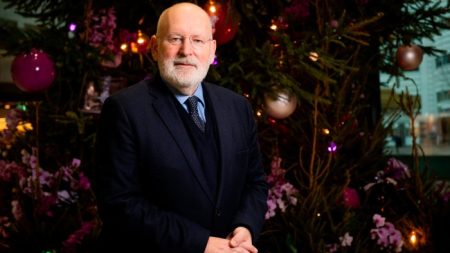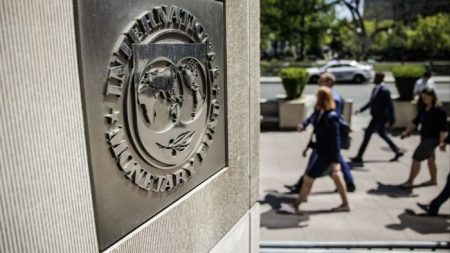Squinting through one half-open eye across a large wooden table, I wonder if this is the first Lunch with the FT to begin with a prayer. It’s a reminder that I am in the presence of American religious royalty.
Franklin Graham is America’s best-known evangelist and heir to its best-known evangelical name. His late father, Billy Graham, was “America’s pastor” — a counsellor to presidents and preacher to millions, famous for “crusades” to save souls everywhere from Australia and the UK to China and the Soviet Russia.
Franklin Graham has continued that mission, and also runs Samaritan’s Purse, a Christian charity that delivers aid to war zones such as Ukraine and Gaza. It has its own pilots and its own planes, which bear the motto: “Helping in Jesus’ Name”.
And earlier this month, on the final climactic night of the Republican National Convention in Milwaukee, he was on stage — squeezed into the schedule between wrestler Hulk Hogan and Ultimate Fighting Championship mogul Dana White — to pray for Donald Trump. “God spared his life,” Graham said, referring to the assassination attempt on the former president five days earlier. He has not officially endorsed Trump, but his admiration for him is plain.
This is not unusual for a conservative Christian elder in America. Just last month — before the shooting in Pennsylvania and then Joe Biden’s withdrawal from the Democratic ticket upended the US election — Trump was the star attraction at a gathering in Washington of evangelical leaders. Evangelicals as a group have become a loyal bedrock of support for Trump in the past eight years, and helped propel him into the White House in 2016. He returned the favour in office by appointing conservative Supreme Court justices who in 2022 helped overturn Roe vs Wade, the 1973 ruling that protected the right to abortion. Trump’s rallies these days open with prayers from local church leaders.
Graham is a hero of the church movement too. And I am in North Wilkesboro, a sleepy town on the edge of North Carolina’s Blue Ridge Mountains that gave birth to the Nascar motoring sport franchise, to ask him, after everything now associated with Trump — the 2020 election denial and 2021 violence at the US Capitol, the court cases and felony convictions — whether Trump is still the leader evangelicals want.
But we are off to a cool start. To what I thought was a broad opener about the political divisions in America as the country hurtles towards November’s election, Graham retorts with a swipe at the media groups — unnamed — that he blames for polarising the nation. “We don’t have journalism any more in America,” he says. “It’s about picking a topic and spinning things for the candidate that you support.”
We are eating food from the canteen at Samaritan’s Purse’s headquarters, a bright, modern office of carpeted floors and wood-framed walls adorned with pictures of the charity’s work around the world. One is a portrait of Trump’s vice-president and Graham’s friend, Mike Pence, holding a Bible.
Graham, 72, is wearing a navy blue jacket over a light blue shirt, the top button undone. He has broad shoulders, an aquiline nose and his white hair is pushed back, a touch unkempt. He has a weathered, outdoorsy look.
“Let’s eat — or your tacos are going to be cold tacos,” he says, before I get another question out. I start tackling a heap of nachos with ground pork, and melted white cheese. Graham has opted for a juicy prime rib sandwich with onions.
Trump is more popular among American conservative Christians than almost any other religious group. “Born again” Christians make up the majority of the US’s Protestant population and more than 80 per cent of white evangelicals would vote for him in November, according to Pew Research. They will be a crucial component of Trump’s base of support in November.
What has long marked out evangelicals — who consider the Bible the word of God and seek a personal relationship with Jesus — is their focus on personal behaviour, eschewing everything from swearing to sexual promiscuity and gambling. Their strictures about holy living seem to evaporate, however, when they consider Trump.
“Trump — he’s been demonised by the media very well,” says Graham, although he concedes: “Is he the poster boy for Christianity? No, he’s not. He’s done a lot of very terrible things in his life.”
But he has also done much good, argues Graham: his pre-Covid economy was strong, inflation was low, and he was president during a period of relative peace in the world, in contrast with the major wars that have erupted since Biden entered office.
Trump has also delivered for Christians. “President Trump was the first one to speak at the March for Life,” notes Graham, a reference to the anti-abortion rally that Trump addressed in 2020. “First president ever to do that. So there are things that evangelicals appreciate, that Christians appreciate.”
Trump also put “dozens” of real Christians in power, including Pence, says Graham. “I’m talking cabinet level, ministerial level, staff. I think two-thirds of the staff were Christians.” By contrast, Biden surrounded himself with a “very radical group”. “I can’t think of one person in the Biden administration who would be supportive of the views I have as a Christian,” Graham says.
Does he doubt the faith of Biden, a churchgoing Catholic? Graham publicly questioned Barack Obama’s Christian faith in 2012, before apologising. Graham won’t judge Biden’s faith. But he is certain that the president is overseeing a creeping secularism that threatens Christianity in the US.
“This country has given great freedom to people of faith,” he says. “And we are losing that a little bit in this country. A little bit of our religious freedoms every year. I think they’re under attack by people that would be secularist, people that don’t believe in God . . . and people that hate God. They don’t believe God should have any say in daily life.”
The notion that religious liberties are under assault feels at odds with my own experience as a churchgoer in a liberal New Jersey town. It is an intriguing claim too, given the power wielded recently by conservative Christians in America, starting with the Supreme Court, which at the beginning of July decided Trump was mostly immune for acts committed while he was president. Several states have passed laws under pressure from evangelicals, including Louisiana’s recent requirement that all school classrooms display the Ten Commandments and Oklahoma’s new law requiring Bibles in classrooms.
But evangelicals have reasons to feel anxious. The number of Americans who attend a religious service every week is now below 50 per cent for the first time, down from 70 per cent at the start of the century, according to Gallup. The apathy is pronounced among the young.
Some American evangelicals have abandoned Trump. In 2019, the editor of Christianity Today — the influential magazine founded by Billy Graham — called for Trump’s removal from office. The current editor, Russell Moore, is also an outspoken critic.
I ask if Graham was as shocked as some other Christians by Trump’s decision to sell a “God Bless the USA” Bible, for $59.99, featuring an American flag on the cover and the US constitution inside. Was this not straight-up idolatry?
Graham is surprised. “I wouldn’t do it that way, OK,” he says. “That’s something he’s chosen to do. And I’m happy for people to read the Bible.”
Graham sips some iced tea. His memoir, Rebel With a Cause, recounted a bucolic childhood of running wild and shooting guns in the Appalachian wilderness, years before he was himself “born again”, gave up smoking and drinking, got a pilot’s licence and developed his yearning for aid missions to conflict zones. The biography is an evangelical archetype: the fallen man who was reborn. But it is also a story of a boy — the fourth of five children — growing up in the shadow of a famous father who was not always present, given his “crusades” to save souls in more secular countries. Graham ended up in a posh private Christian school on Long Island for a while, then in private Christian colleges. By his own telling, he was a risk-taker. It might have made for a winning move into elected politics. But Graham chose instead a muscular form of missionary work and evangelism.
We focus on our dessert, a large slice of apple pie with rapidly melting ice cream. I ask about Christian nationalism and white supremacy. Critics say US evangelicals are seeking to dominate the country, legally and culturally, imposing a nativist, patriarchal, and deeply conservative version of Christianity on America.
“‘Christian nationalism’ — that’s a coin that the media has come up with. It is to divide our country, it’s to polarise people,” Graham says. “And then there’s ‘white supremacy’,” he adds, lacing the term with scepticism. “There are people that are bent on destroying our country,” he says, referring to the people making the claims.
“They are people that want to see a one-world system, a one-world government — that see the United States as hindering that. And there are people that don’t want the American dollar to be the standard of currency in the world . . . There are people in America, in Europe and Russia, who want this.” He adds, in a reference to the influx of immigrants into the US under Biden: “And having an open border is part of it.”
Many American evangelicals are now virulently opposed to more US immigration and Democrats’ more open stance on asylum. Trump has talked about immigrants “poisoning the blood” of the country and some critics of evangelicals think their stance on the border is another example of Christian nationalism.
But Graham gives this short shrift. “Fifteen million people have come to this country illegally under President Biden. Because I would oppose that, that would make me a Christian nationalist? Because I want to see legal immigration and not illegal immigration?”
Should the US, I ask, be a Christian country? “No,” he says flatly. “I don’t think any one culture should have the wherewithal to impose it on everybody else.”
Graham’s father Billy had disavowed segregation while it was still prevalent in the south, and preached alongside Martin Luther King Jr — although his history with the civil rights movement is complex. Franklin Graham says the country is still “evolving” on race and moving beyond its troubled past.
It is an optimistic reading, given the protests that convulsed the US after George Floyd’s murder just four years ago. Trump, who polls show to be growing more popular with Black Americans, came to power touting the racist “birtherism” conspiracy about Barack Obama. Have race relations really improved since Trump replaced America’s first Black president?
“I think Obama hurt race relations in this country,” Graham says. “I think a lot of white people voted for him to try to clear their guilty conscience, thinking, ‘Well, you know, we’ve checked a box now with a Black president’ and I think that set things back.” I struggle to think of an adequate follow-up.
Our dishes are now empty. The rain is clearing outside the big picture windows in our room, but the Blue Ridge Mountains are still barely visible through the mist. Inside Samaritan’s Purse’s plush offices, it is easy to forget that the organisation itself, like its boss, is controversial.
In 2020, when Samaritan’s Purse was invited into New York to help treat Covid-19 patients at the worst moment of the crisis, some people objected to its pop-up hospital in Central Park, citing Graham’s opposition to same-sex marriage.
Touring its facilities before lunch, I was struck by the scale of its aid effort, with teams ready to pack food, field hospitals and even medics on to aircraft destined for conflict zones. Some liberals would recoil at this missionary do-goodery — but desperate people will get help.
But it still begs the question of how people determined to do God’s work remain so loyal to Trump. What about his attempt to overturn the 2020 election — and his supporters’ violence at the Capitol on January 6 2021?
I ask Graham about this, and Trump’s treatment of his friend, the devout evangelical and traditional conservative Mike Pence. Trump implored Pence to use his constitutional power as vice-president to overturn Biden’s election. Pence refused. When the mob stormed the Capitol on January 6, they bayed for his execution for treason. Some erected a gallows.
Graham tells me he was in the White House with Pence on election night in 2020. Graham had some doubts about the result, initially, but Pence reassured him that there was no evidence of electoral manipulation. Pence has said he will not back Trump in November. Trump has vowed to pardon people convicted of violence on January 6.
Trump and Pence had a “very serious disagreement over the interpretation of the constitution . . . so that’s unfortunate”, Graham says. As for the Capitol riot itself, it was “wrong”. But people genuinely believed the election had been stolen when they turned up in Washington “to demand that their voice be heard”.
Graham warns that it could happen again. “And they’re not going to go down to the Capitol to throw rocks and break windows next time. It could be something much worse.”
He seems just as concerned about Democrats “doing everything they can” to put Trump in jail to prevent his re-election. It is a refrain heard repeatedly these days on conservative media, even if the Supreme Court has now deemed Trump largely immune from acts committed while he was president and he is unlikely to face another trial before November’s election.
But Graham’s suspicion of Democrats is another reminder that as much as Trump’s opponents consider him a threat to democracy, many Republicans think the same of the Democrats — an ominous sign for November’s election.
Later, Graham will tell me by email that Trump’s conviction in the hush-money trial has done nothing to change his view of the most “pro-Christian and pro-Life president in my lifetime”.
Americans understand that Trump is not the “pastor-in-chief”, Graham had said over lunch, and listed his successes as president, from the economy to his willingness to talk with America’s foes. That is how evangelicals would decide to vote too, he suggested.
“I think many Christians just take Christianity out of it.”
Derek Brower is the FT’s US political news editor
This article has been corrected to clarify that evangelical Christians make up the majority of the US’s Protestant population, not its Christian population
Find out about our latest stories first — follow FT Weekend on Instagram and X, and subscribe to our podcast Life & Art wherever you listen
Read the full article here












